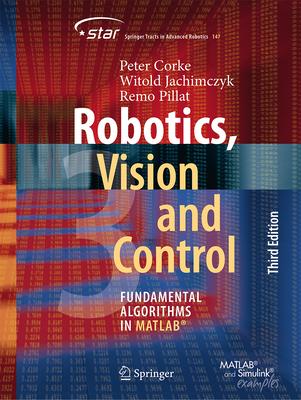This textbook provides a comprehensive, but tutorial, introduction to robotics, computer vision, and control. It is written in a light but informative conversational style, weaving text, figures, mathematics, and lines of code into a cohesive narrative. Over 1600 code examples show how complex problems can be decomposed and solved using just a few simple lines of code.
This edition is based on MATLAB(R) and a number of MathWorks(R) toolboxes. These provide a set of supported software tools for addressing a broad range of applications in robotics and computer vision. These toolboxes enable the reader to easily bring the algorithmic concepts into practice and work with real, non-trivial, problems. For the beginning student, the book makes the algorithms accessible, the toolbox code can be read to gain understanding, and the examples illustrate how it can be used. The code can also be the starting point for new work, for practitioners, students, or researchers, by writing programs based on toolbox functions. Two co-authors from MathWorks have joined the writing team and bring deep knowledge of these MATLAB toolboxes and workflows.
Book
Robotics, Vision and Control: Fundamental Algorithms in Matlab(r)
(Write a Review)
Paperback
$64.99
This textbook provides a comprehensive, but tutorial, introduction to robotics, computer vision, and control. It is written in a light but informative conversational style, weaving text, figures, mathematics, and lines of code into a cohesive narrative. Over 1600 code examples show how complex problems can be decomposed and solved using just a few simple lines of code.
This edition is based on MATLAB(R) and a number of MathWorks(R) toolboxes. These provide a set of supported software tools for addressing a broad range of applications in robotics and computer vision. These toolboxes enable the reader to easily bring the algorithmic concepts into practice and work with real, non-trivial, problems. For the beginning student, the book makes the algorithms accessible, the toolbox code can be read to gain understanding, and the examples illustrate how it can be used. The code can also be the starting point for new work, for practitioners, students, or researchers, by writing programs based on toolbox functions. Two co-authors from MathWorks have joined the writing team and bring deep knowledge of these MATLAB toolboxes and workflows.Paperback
$64.99